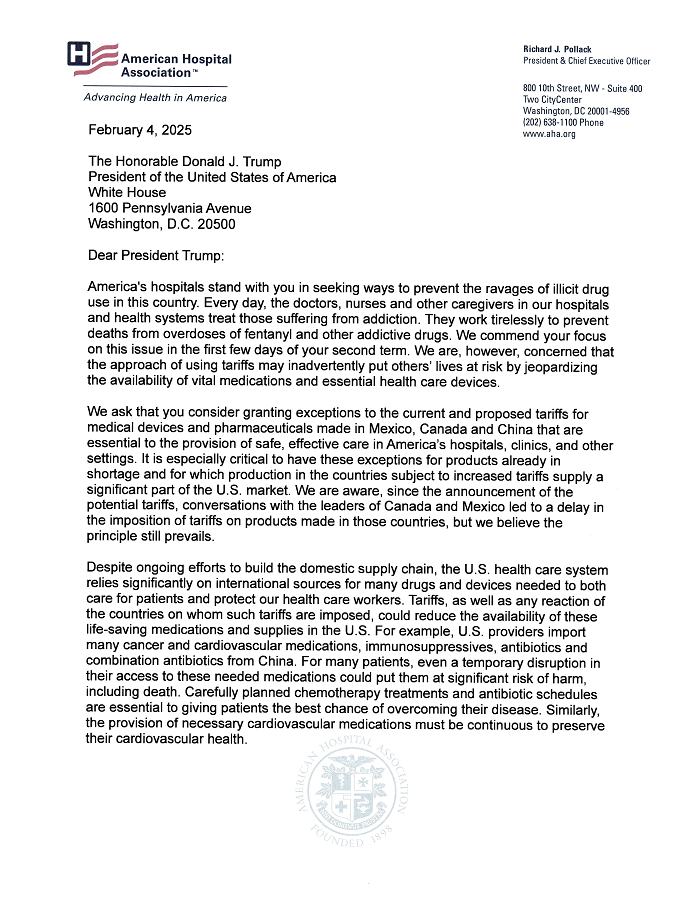

AHA Urges Administration to Grant Exceptions for Tariffs for Medications and Medical Supplies
February 4, 2025
The Honorable Donald J. Trump
President of the United States of America
White House
1600 Pennsylvania Avenue
Washington, D.C. 20500
Dear President Trump:
America's hospitals stand with you in seeking ways to prevent the ravages of illicit drug use in this country. Every day, the doctors, nurses and other caregivers in our hospitals and health systems treat those suffering from addiction. They work tirelessly to prevent deaths from overdoses of fentanyl and other addictive drugs. We commend your focus on this issue in the first few days of your second term. We are, however, concerned that the approach of using tariffs may inadvertently put others' lives at risk by jeopardizing the availability of vital medications and essential health care devices.
We ask that you consider granting exceptions to the current and proposed tariffs for medical devices and pharmaceuticals made in Mexico, Canada and China that are essential to the provision of safe, effective care in America's hospitals, clinics, and other settings. It is especially critical to have these exceptions for products already in shortage and for which production in the countries subject to increased tariffs supply a significant part of the U.S. market. We are aware, since the announcement of the potential tariffs, conversations with the leaders of Canada and Mexico led to a delay in the imposition of tariffs on products made in those countries, but we believe the principle still prevails.
Despite ongoing efforts to build the domestic supply chain, the U.S. health care system relies significantly on international sources for many drugs and devices needed to both care for patients and protect our health care workers. Tariffs, as well as any reaction of the countries on whom such tariffs are imposed, could reduce the availability of these life-saving medications and supplies in the U.S. For example, U.S. providers import many cancer and cardiovascular medications, immunosuppressives, antibiotics and combination antibiotics from China. For many patients, even a temporary disruption in their access to these needed medications could put them at significant risk of harm, including death. Carefully planned chemotherapy treatments and antibiotic schedules are essential to giving patients the best chance of overcoming their disease. Similarly, the provision of necessary cardiovascular medications must be continuous to preserve their cardiovascular health.
Beyond the use of these finished products, many raw ingredients for pharmaceuticals come from China. These are commonly known as active pharmaceutical ingredients (APls). These chemicals are the most important components of any pharmaceutical manufacturer's supply chain. The U.S. gets nearly 30% of its APls from China, meaning that these tariffs may also limit the availability of U.S. drug manufacturers to produce critical drugs here in the U.S.1
China is also the source of many medical devices. Some of these devices are single use devices designed to protect the patient from infection, such as single-use blood pressure cuffs, stethoscope covers and sterile drapes. Others are small devices used ubiquitously in hospitals, such as anesthesia instruments, cautery pencils, needles and syringes, pulse oximeters and blood pressure cuffs. Disruption in the availability of these instruments would curtail hospitals' ability to perform life-saving surgeries and keep patients safe from contagion and greatly reduce our ability to effectively diagnose and monitor patient conditions.
Finally, the protection of our health care workers from infectious diseases is vital to their health and the ability of the health care system to continue caring for patients. Health care workers need gowns, gloves, face masks, respirators and other equipment, much of which is manufactured in China and cannot be easily replaced by domestic manufacturers. In 2023, Chinese manufacturers provided the majority of the N95 and other respirators used in health care. Additionally, China was the source for one-third of the disposable face masks, two-thirds of the non-disposable face masks, and 94% of the plastic gloves used in health care.2 The lack of this essential equipment will not only put patients at risk but also threaten our health care delivery personnel.
Thank you for your consideration of our concerns on this important matter. We welcome the opportunity to discuss how to preserve access to essential pharmaceuticals and devices with your team. Please feel free to have your designee contact me or Nancy Foster, AHA vice president for quality and patient safety policy, at 202-626-2337 or nfoster@aha.org.
Sincerely,
/s/
Richard J. Pollack
President and Chief Executive Officer
- Neils Graham, Atlantic Council, April 19, 2023; The US is relying more on China for pharmaceuticals and vice versa.
- AdvaMed presentation 2023


